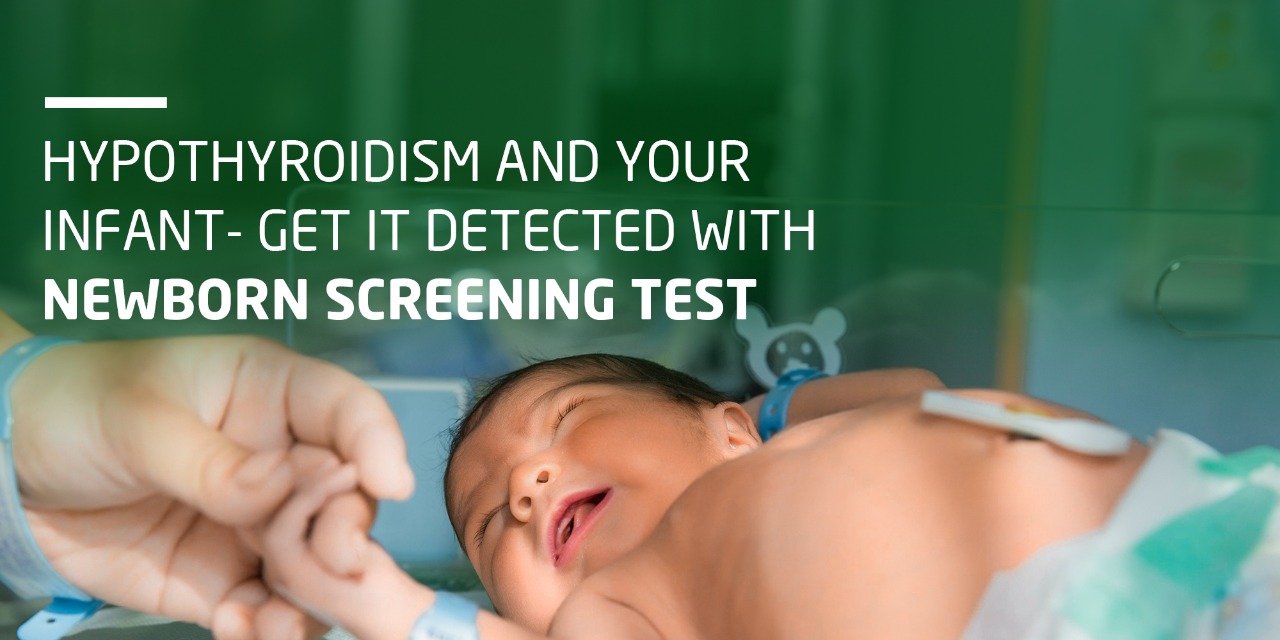There are many cases when a newborn is born with a condition called hypothyroidism, and parents become surprised that their baby is having thyroid problems. The signs of hypothyroidism are usually subtle or hidden in an infant, and not all symptoms are found in every hypothyroid baby. The parents who have conducted newborn screening tests on their babies after birth can get this disease diagnosed at the early stages of life and this can help manage this disease with initial treatment. The signs and symptoms of this problem are usually subtle or hidden in an infant, and not all symptoms are found in every hypothyroid baby.
What is Congenital Hypothyroidism?
This is a medical condition in which the thyroid gland is not able to produce enough thyroid hormone that is required for a baby’s body growth and development. According to the latest research reports, around 1 in 4,000 babies is detected with hypothyroidism.
What is the Importance of Thyroid Gland?
It is a small, butter-fly-shaped gland that is located in the front of the neck. The functioning of this gland is to extract or obtain iodine from the food one consumes and use it to make thyroid hormone or thyroxine or ‘T4’. The thyroxine hormone plays an important role in the growth and development, and if the thyroid gland is not developed properly then it will not produce enough thyroxine, which plays an important role in a baby’s body growth and also in the brain development.
The thyroid gland is under the control of the pituitary or master gland which is located at the base of the brain. If there is less amount of T4 hormone in the body, then the pituitary gland senses it and releases thyroid-stimulating hormone (TSH) in the body. This TSH will stimulate the thyroid gland to produce more T4 and once enough T4 is produced that is needed by the body then TSH levels drop to a usual level. In babies who are hypothyroid and their thyroid gland is not properly developed and it cannot produce enough T4. This will cause the pituitary gland to work hard to stimulate the thyroid gland by producing high levels of TSH. This will cause the babies to have a low level of T4 and a high TSH level.
What are the Causes That the Thyroid Gland is Not Working Properly?
The most common cause is improper growth of the thyroid gland. During the early gestation period, the thyroid gland development begins and it starts to form at the base of the brain, and then it moves to the lower neck area once it finishes its growth. Sometimes, the process got interrupted and leaves only a small piece of thyroid at the abnormal location. In some cases, the baby will lack the thyroid gland, and others involve the lack of stimulation by the pituitary gland or an inability of the thyroid gland to properly make thyroid hormone, and this will affect baby growth and development.
What Are the Chances That the Future Babies Will Be Born With Hypothyroidism?
Around 1 in every 4,000 babies are born with hypothyroidism, and there are higher chances of having a second baby with hypothyroidism. There is presently no reliable way of detecting hypothyroidism before birth, but after birth, it can be detected with a newborn screening test.
Newborn Screening Hypothyroid Test
The test is performed after a few hours of the baby’s birth and a few drops of blood are taken from the baby’s heel and is sent for assessment for the diagnosis of the disease. If the child is detected positive secondary tests are performed and parents must consult a pediatric endocrinologist. High levels of TSH indicate that the child may have congenital hypothyroidism. The word congenital means the problem starts at birth and is different from thyroid disease in adults.
What To Do?
Consult a children’s doctor who specializes in hormone problems such as hypothyroidism. Repeat measurement of T4 and TSH will be done on blood drawn from a vein. This is done to confirm the diagnosis of hypothyroidism. Several other tests may be done to check whether the baby has the normal amount of thyroid tissue, where it is located, and how well it makes thyroid hormone.
Untreated Hypothyroidism Affects the Baby
The most noticeable effects usually involve:
Skin: Newborn jaundice, which gives the skin a yellow tint, may last longer than usual in some hypothyroid newborns. Especially when unclothed, the baby’s skin may appear pale or blotchy.
Activity and Development: Hypothyroid babies are usually silent and seldomly cry. They could appear uninterested in what they see and hear around them. They may doze off for several hours and frequently need to be roused to eat. When picked up, they could feel ‘floppy’.
Appetite and digestion: Babies with hypothyroidism may not be interested in nursing or drinking from a bottle, and it may be challenging to stay awake while being fed. They can have stomach gas retention and be severely constipated.
Growth: Hypothyroid babies are commonly large as newborns. If their hypothyroidism is not treated, they generally have poor postnatal growth and weight gain.
Poor Circulation: Babies suffering from hypothyroidism may have a slow heart rate and low blood pressure. Due to poor circulation, the hands and feet may be cool to the touch.

